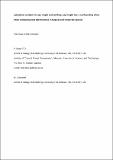Latitudinal variation in day length and working day length has a confounding effect when comparing nest attentiveness in tropical and temperate species
Abstract
During incubation, tropical passerines have been shown to have lower levels of nest attentiveness than their counterparts at north temperate latitudes, spending a higher percentage of daylight time off the nest. This difference has been interpreted as evidence of parental restraint; tropical birds allocate more time to daily self-maintenance, perhaps preserving their higher annual survival rates and future breeding potential. But such comparisons are susceptible to the confounding effects of day length variation, because a given amount of time spent off the nest will account for a greater percentage of daylight time near to the equator than at high latitudes during spring and summer. Based on a pattern of increasing day length between 0° and 70°N, we show that the impact of this bias is likely to be small where sites are separated by less than 30°–40° of latitude, but should increase substantially both with latitudinal span and distance from the equator. To illustrate this effect, we compared nest attentiveness in two congeners breeding at 1°S and 52°N. During incubation, Stripe-breasted Tits Parus fasciiventer in Uganda had a shorter working day (time from emerging to retiring) than north temperate Great Tits P. major, and spent a higher percentage of daylight time off the nest (32 %) than Great Tits in the UK (24 %). However, this difference was almost wholly explained by the latitudinal difference in day length; the amount of time spent off the nest differed by just 10 min day−1 (<1 % of the 24-h cycle). We show that this effect may be moderated by the change in working day length, which increased less rapidly (in relation to latitude) than day length. Although these effects can thus confound latitudinal comparisons of nest attentiveness, accentuating a pattern predicted by life-history theory, they are avoidable if attentiveness is expressed as the percentage of time or the number of minutes spent incubating per 24 h.
Citation
Shaw , P & Cresswell , W 2014 , ' Latitudinal variation in day length and working day length has a confounding effect when comparing nest attentiveness in tropical and temperate species ' , Journal of Ornithology , vol. 155 , no. 2 , pp. 481-489 . https://doi.org/10.1007/s10336-013-1029-1
Publication
Journal of Ornithology
Status
Peer reviewed
ISSN
2193-7192Type
Journal article
Description
We gratefully acknowledge the financial support provided by the British Ornithologists’ Union and the African Bird Club.Collections
Items in the St Andrews Research Repository are protected by copyright, with all rights reserved, unless otherwise indicated.

